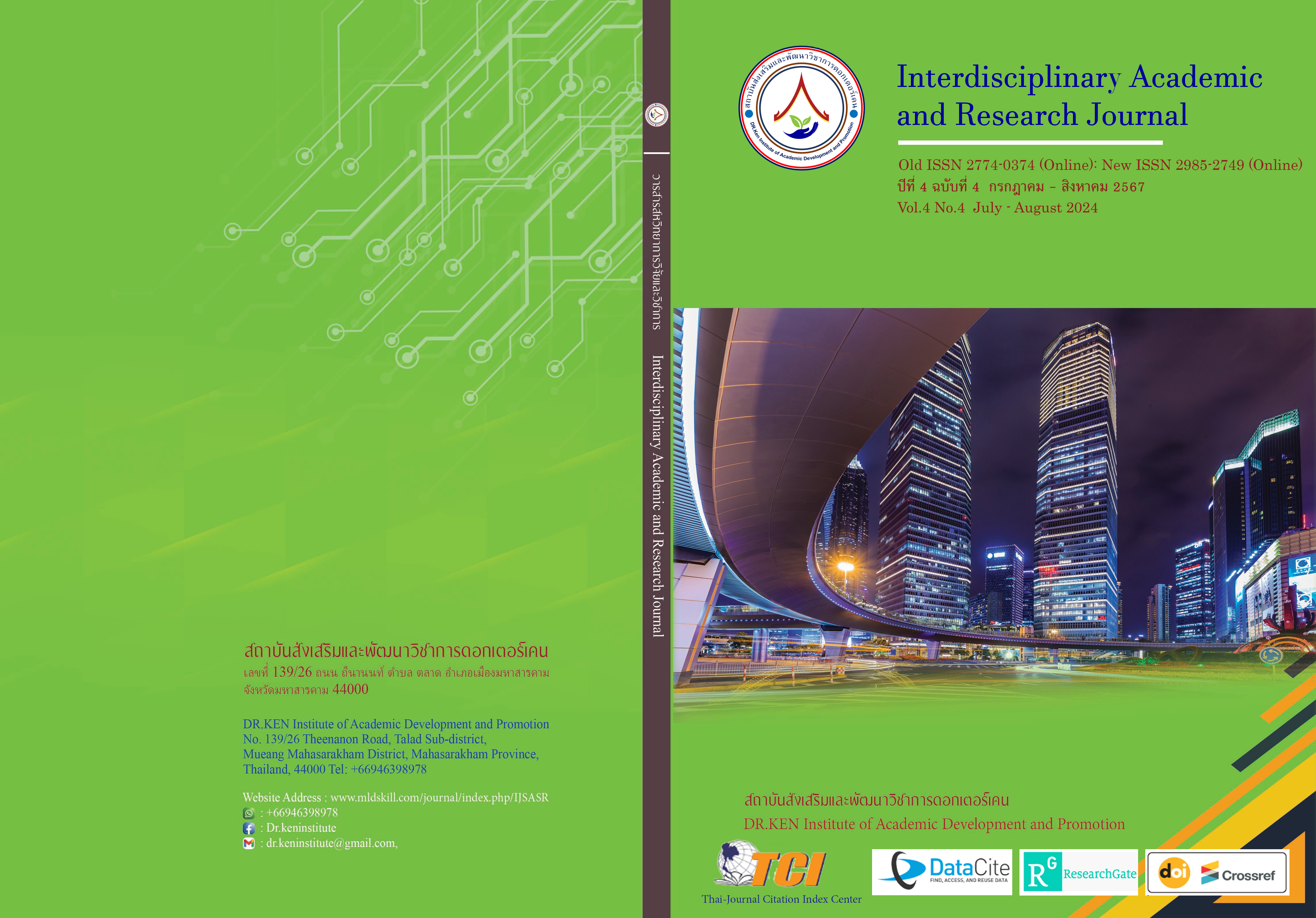School Administrator’s Leadership Styles Organizational Climate of School Affecting Teacher Happiness
DOI:
https://doi.org/10.60027/iarj.2024.276855Keywords:
Administrator’s Leadership Styles;, Organizational Climate;, Teacher HappinessAbstract
Background and Aims: The school are an organization established to provide education and promote learning to students. The aim is for personnel to work happily. The leadership of educational institution administrators and the organizational atmosphere in educational institutions therefore play an important role in promoting happiness in educational organizations. The purposes of this research are as follows: (1) to study the level of school administrator’s leadership styles, the organizational climate of the school, and the teacher happiness in school. (2) to study the relationship between school administrators’ leadership styles and the organizational climate of the school and the teacher happiness in school (3) to study the leadership style of school administrator’s leadership styles and the organizational climate of the school affecting the teacher happiness in school.
Methodology: The samples in this research were 361 teachers of schools in the Don Mueang District, Bangkok. Special education teachers and related teachers from 191 schools under the Don Mueang District, Bangkok. The data analysis included mean and standard deviation. To test the hypothesis, this study used the Pearson product-moment correlation coefficient, multiple correlation, and multiple Regression Analysis-Enter Method.
Conclusion: The research results were as follows: (1) the level of the leadership style of school administrators’ leadership styles were at a high level, the level of the organizational climate of the school was at a high level, the level of teacher happiness in school was at a high level.; (2) the relationship between school administrator’s leadership styles and the organizational climate of the school was related to the teacher happiness in school, with all variables having a Pearson correlation coefficient (r) ranging from -.087 to .635 (3) school administrator’s leadership styles and the organizational climate of school factor together predicted the teacher happiness in school by 37.30 (R2 = .373)
References
เมธาพร เชื้อหอม. (2559). บรรยากาศองค์การในโรงเรียนที่ส่งผลต่อคุณภาพชีวิตการทำงานของข้าราชการครูสังกัดสำนักงานเขตพื้นที่การศึกษาฉะเชิงเทรา เขต 1. วิทยานิพนธ์ปริญญามหาบัณฑิต: มหาวิทยาลัยราชภัฏราชนครินทร์.
ไทยรัฐออนไลน์. (2566). ส่องความสุข-สุขภาพจิตคนไทย วันนี้ยังสบายดี หรือไม่. Retrieved from: https://www.thairath.co.th/scoop/infographic/2350610
กรรณิการ์ บุญมาก. (2560). ความสัมพันธ์ระหว่างภาะผู้นำของผู้บริหารสถานศึกษากับความสุขในการทำงานของครูผู้สอนในกลุ่มโรงเรียนบางละมุง 1 สังกัดสำนักงานเขตพื้นที่การศึกษาประถมศึกษาชลบุรี เขต 3. วิทยานิพนธ์ปริญญามหาบัณฑิต: มหาวิทยาลัยบูรพา.
คทาวุธ ม่วงแก้ว. (2558). บรรยากาศองค์กรในสถานศึกษาขั้นพื้นฐานตามความคิดเห็นของผู้บริหารและครู สังกัดสำนักงานเขตพื้นที่การศึกษาลพบุรี. วิทยานิพนธ์ปริญญามหาบัณฑิต: มหาวิทยาลัยราชภัฏเทพสตรี, ลพบุรี.
จันทร์เพ็ญ สินนาม. (2563). บรรยากาศองค์การในสถานศึกษาสังกัดสำนักงานเขตพื้นที่การศึกษามัธยมศึกษาเขต 28. วิทยานิพนธ์ปริญญามหาบัณฑิต: มหาวิทยาลัยราชภัฏศรีสะเกษ.
ณัติธร ศรีรักษา. (2565). ปัจจัยที่ส่งผลต่อความสุขในการทำงานของครู โรงเรียนมัธยมศึกษา กลุ่มสหวิทยาเขตชลบุรี สังกัดสำนักงานเขตพื้นที่การศึกษามัธยมศึกษาชลบุรี ระยอง. วิทยานิพนธ์ปริญญามหาบัณฑิต: มหาวิทยาลัยบูรพา.
ธนภร จันทร์สี. (2557). ปัจจัยที่สำคัญที่มีผลต่อความสุขในการทำงานของครู สังกัดสำนักงานเขตพื้นที่การศึกษาประถมศึกษาเลย เขต 1. วิทยานิพนธ์ปริญญามหาบัณฑิต: มหาวิทยาลัยราชภัฏเลย.
นฤมล คูหาแก้ว. (2563). ภาวะผู้นำของผู้บริหารสถานศึกษาในศตวรรษที่ 21 สังกัดสำนักงานเขตพื้นที่การศึกษาประถมศึกษาสระแก้ว เขต 2. วิทยานิพนธ์ปริญญามหาบัณฑิต: ราชภัฏรำไพพรรณี.
ปัฐมาภรณ์ วิฬาสุวรรณ์. (2565). บรรยากาศองค์การในสถานศึกษาตามความคิดเห็นของครู สังกัดสำนักงานเขตพื้นที่การศึกษาประถมศึกษาสงขลา เขต 1. วิทยานิพนธ์ปริญญามหาบัณฑิต: มหาวิทยาลัยหาดใหญ่.
ผกาวรรณ ติยัพเสน. (2560). การศึกษาความสุขในการทำงานของครู โรงเรียนบดินทรเดชา (สิงห์ สิงหเสนี) 4 สังกัดเขตพื้นที่การศึกษามัธยมศึกษา เขต 2. วิทยานิพนธ์ปริญญามหาบัณฑิต: มหาวิทยาลัยบูรพา.
สมชาย คบขุนทด, รัชฎา ฟองธนกิจ และนพดล บุรณนัฏ. (2562). ปัจจัยความสุขในการทำงานของพนักงานในคอนโดมิเนียม จังหวัดภูเก็ต. วารสารสมาคมนักวิจัย. 24(3), 41-56
สำนักงานขับเคลื่อนการปฏิรูปประเทศ ยุทธศาสตร์ชาติ และการสร้างความสามัคคี ปรองดอง. (2561). ยุทธศาสตร์ชาติ 20 ปี พ.ศ. 2561-2580. Retrieved from: http://nscr.nesdc.go.th/ns/
สำนักงานส่งเสริมสังคมแห่งการเรียนรู้และคุณภาพเยาวชน. (2556). หกปัญหาที่เป็นอุปสรรคของครูไทย. Retrieved from: https://www.isranews.org/content-page/item/18823 -1628907973.html
สำนักงานสภาพัฒนาการเศรษกิจและสังคมของแห่งชาติ. (2566). แผนพัฒนาเศรษฐกิจและสังคมแห่งชาติ ฉบับที่ 13. Retrieved from: https://www.nesdc.go.th/main.php?filename=plan13
สุธิกานต์ บริเอก. (2564). ภาวะผู้นำของผู้บริหารสถานศึกษาที่ส่งผลต่อการปฏิบัติงานของครูผู้สอนในโรงเรียน สังกัดสำนักงานเขตพื้นที่การศึกษามัธยมศึกษา เขต 33. วิทยานิพนธ์ปริญญามหาบัณฑิต: มหาวิทยาลัยราชภัฏสกลนคร.
สุวิมล ติรกานันท์. (2551). ระเบียบวิธีการวิจัยทางสังคมศาสตร์: แนวทางสู่การปฏิบัติ. พิมพ์ครั้งที่ 7. กรุงเทพฯ : โรงพิมพ์แห่งจุฬาลงกรณ์มหาวิทยาลัย.
Boonkhoklam, P., Nilkote, R., & Boonloy, W. (2023). LEADERSHIP OF WOMEN SCHOOL ADMINISTRATORS AFFECTS THE HAPPINESS IN THE WORKPLACE OF TEACHERS AND EDUCATIONAL PERSONNEL IN SCHOOLS UNDER THE SECONDARY EDUCATIONAL SERVICE AREA OFFICE CHANTHABURI TRAT. Journal of MCU Nakhondhat, 10(5), 142–152. Retrieved from https://so03.tci-thaijo.org/index.php/JMND/article/view/269183
Halpin, A.W. (1966). Theory and Research in Administration. Macmillan.
House, R.J., & Mitchell, T.R. (1974). Path-Goal Theory of Leadership. Journal of Contemporary Business, 9, 81-97.
Krejcie, R.V., & Morgan, D.W. (1970). Determining Sample Size for Research Activities. Educational and Psychological Measurement, 30, 607-610. https://doi.org/10.1177/001316447003000308
Manion, J. (2003). Joy at work: Creating a positive workplace. Journal of Nursing Administration, 33(12), 652-659.
Downloads
Published
How to Cite
Issue
Section
License
Copyright (c) 2024 Interdisciplinary Academic and Research Journal

This work is licensed under a Creative Commons Attribution-NonCommercial-NoDerivatives 4.0 International License.
Copyright on any article in the Interdisciplinary Academic and Research Journal is retained by the author(s) under the under the Creative Commons Attribution-NonCommercial-NoDerivatives 4.0 International License. Permission to use text, content, images, etc. of publication. Any user to read, download, copy, distribute, print, search, or link to the full texts of articles, crawl them for indexing, pass them as data to software, or use them for any other lawful purpose. But do not use it for commercial use or with the intent to benefit any business.
















.png)


